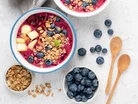
Nutrition is an amazing tool, providing the foundations of wellbeing – but many people don’t realise how it can impact our mental health, too. It’s incredible how a few simple dietary and lifestyle tweaks can boost our wellbeing. I would recommend giving these a try first!
1.Focus on fats. Having too much of the wrong fats can wreak havoc on your mental health. For example, although Omega-6 is an essential fatty acid, when we have too much of it, it can become an inflammatory driver. Inflammation has of course been linked to a number of chronic diseases, as well as mental health issues, such as depression. To counter this, we should be looking to eat more Omega-3-rich foods (good fats), such as oily fish, or algae for vegans.
2. Kick caffeine. We’ve become a coffee culture, which has caused us to typically consume too many stimulants through caffeine. Although stimulants aren’t necessarily bad in small amounts, having too much can fire up our adrenals – where our stress hormones come from – causing our systems to wear out by creating too much stress. And, as we all know, stimulants dysregulate sleep, so if you’re waking up in the middle of the night and feeling irritable the next day, there’s a good chance it could be because you’re consuming too much caffeine. Try caffeine free drinks such as peppermint tea, or weak black tea (less caffeine)
3. A good gut. Gut health plays a vital role in regulating our mental wellbeing – in fact, our guts are often called our second brains. What we didn’t know, probably even 10 years ago, was the role that microbes play and how the wrong kind of bacteria can cause all sorts of health related issues. The gut really is the central hub and the core of good health, yet it’s greatly overlooked. There are many factors that come into play when looking after the gut, but I would say to eat a balanced diet with a wide variety of fruits, vegetables, herbs and spices. Try sauerkraut or kefir which are both foods that encourage a healthy gut microbiome.
4. The right vitamins. Almost every cell in our body has vitamin D receptors, and although it’s a crucial part in our wellbeing, many of us are deficient in it. Generally speaking, it’s very difficult to get vitamin D through the diet – you can only really get it through sunlight. To absorb vitamin D, 20% of our skin needs to be exposed to the sun, which is actually quite challenging, as many of us have lifestyles that require us to spend most of our days indoors. Try supplementing in the winter with D3 (and K2 – K2 helps absorption).
Featured Articles
B Corporation certification has long been hailed as the gold standard of sustainability – we explore why
How does a retail investor replicate, as closely as possible, a venture capital investment strategy? Paula Tavangar of SwissBorg Ventures explores
Michelle Li shares how parents can ensure their children are taking the right steps to a more sustainable future



